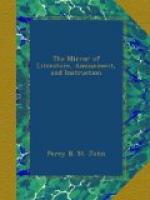Why do we so often fail in rearing young birds?
Because of our ignorance of their requisite food. Every one who has made the attempt, well knows the various expedients he has resorted to, of boiled meats, bruised seeds, hard eggs, boiled rice, and twenty other substances that Nature never presents, in order to find a diet that will nourish them; but Mr. Montagu’s failure, in being able to raise the young of the curl-bunting, until he discovered that they required grasshoppers, is a sufficient instance of the manifest necessity there is for a peculiar food in one period of the life of birds.—Knapp.
Why have most noctural birds large eyes and ears?
Because large eyes are necessary to collect every ray of light, and large concave ears to command the smallest degree of sound or noise.
Why do stale eggs float upon water?
Because, by keeping, air is substituted for a portion of the water of the egg, which escapes.—Prout.
Why has the breast-bone of all birds which fly, a long ridge or keel?
Because muscles are attached to it, to facilitate their flight.
Why is the plumage of aquatic birds kept dry?
Because the small feathers next the bird fall over each other like the tiles of a roof, and thus throw off the water.
* * * * *
FESTIVALS, GAMES, AND AMUSEMENTS.
BY HORATIO SMITH, ESQ.
(National Library—Vol. v.)
The readers of The Mirror will doubtless expect in its pages some notice of the present work; although it belongs to a Series, which as yet possesses but few attractions for our attention. The title of the volume before us, and the name of its author, however, led us to expect better things; and sorry are we to have little but disappointment to report to the reader.
Mr. Smith sets out by telling us, in his Preface, that he has only been able to produce a mediocre book, and at once shows that his task has been by no means a grateful one. He talks of compilation and selection as if they were the very drudgery of literature, although in the present instance he has executed both so indifferently. He speaks of condensing into “one little volume,” whereas the plan adopted by him has but little of the labour of condensation, his book being little but slice upon slice, like preserved fruit, instead of being thoroughly mixed and reduced like jelly. With Strutt’s Sports and Pastimes, and Ellis’s Edition of Brand’s Popular Antiquities before him, he might have produced a volume of exhaustless interest and value, set with hundreds of foot-note references, which he has made but few and far between. Nay, with the example of Brand before him (for we see that he is occasionally quoted), it is difficult to conceive how Mr. Smith could overlook so important a point as the distinct acknowledgment of his authorities.




